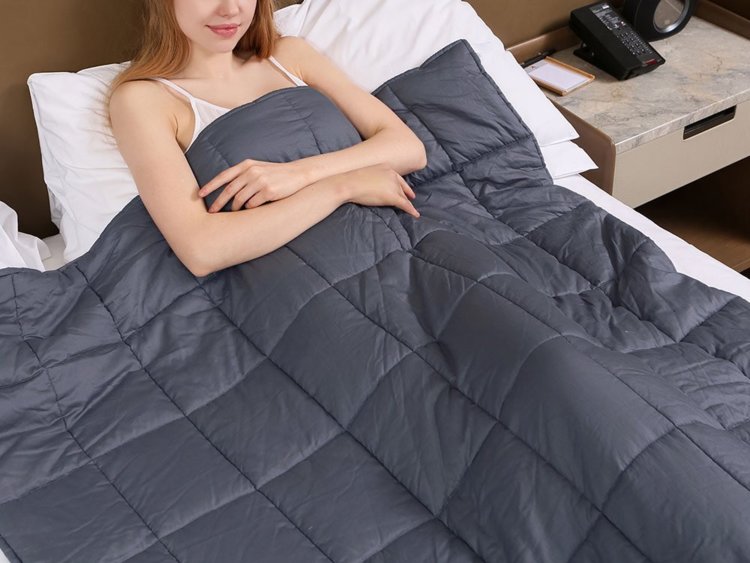Weighted Blankets For PTSD: Guide To An Alternative Therapy
Living with PTSD sometimes can be a living nightmare.
Also, chronic nightmares and recurring disturbing flashbacks will haunt you, due to a traumatic event that you might’ve experienced in your life.
Altogether, this will impact the quality of your life, sleep, physical and mental health.
Fortunately, many remedies can help you diminish the mark that a particularly traumatic event has left on your life and improve the overall quality of your life – both mental and physical.
Among the solutions lies the therapy that I will present to you today – weighted blankets for PTSD.
People often ask whether weighted blankets are a valid and effective method of treating PTSD. The short answer is – Yes.
In broad strokes, weighted blankets will reduce stress and anxiety levels by keeping your body and mind in a healthy and balanced state.
The therapeutic effects of weighted blankets don’t end there. You will finally achieve a satisfactory and healthy sleeping schedule, which I know sometimes seems like an abstract noun to people suffering from PTSD.
After we explore the symptoms to understand this disease completely, we will proceed to learn how are these benefits of weighted blankets achieved.
What is PTSD (Post-Traumatic Stress Disorder)?

PTSD, which stands for Post-Traumatic Stress Disorder, is a mental health condition that occurs after a traumatic life event a person has experienced or witnessed.
Some common examples of people who suffer from PTSD include people who have been in war or a life-threatening accident, victims of physical and mental abuse or participants of a terrorist attack.
The number of people who suffer from PTSD in the US goes as high as 8 million during a year.
Also, keep in mind that the definition of a “traumatic life event” varies for each individual. What they will have in common is that this condition will trigger a series of physical and mental symptoms they will experience.
Common PTSD Symptoms include:
- Disturbing thoughts – This symptom occurs on the mental level of a person who suffers from PTSD. It includes flashbacks to the traumatic event, which can be extremely stressful for a person. It is also connected to nightmares and sleepwalking, which ruins the quality of sleep. Ultimately, this symptom can be put down to three disturbing words: reliving the trauma.
- High levels of anxiety – Anxiety manifests itself in many ways, but some common symptoms that people with PTSD experience are panic attacks, constant “alertness” of their body (as if they are in a dangerous situation), fear and apprehension.
- Unpleasant emotions – Negative feelings of sadness and hopelessness may overcome sufferers from PTSD, which collides with low self-esteem, loss of interest in activities and alienation from people. If this symptom is not treated, it can also lead to depression.
- Defense mechanisms – Using defense mechanisms may also be a common sign of PTSD. In particular, people who suffer from PTSD use avoidance – avoid the situations that can potentially lead to a situation similar to the one where the traumatic event occurred. This can seriously interfere with one’s life.
For example, a sufferer from an accident-related-event can try and avoid every contact with transportation. In extreme cases, this symptom can also lead to agoraphobia, the fear of public places. - Increased fatigue – Sleep deprivation, a common symptom of PTSD, can result in an overall feeling of tiredness and lack of energy.
What all PTSD symptoms have in common is that they ruin the overall quality of one’s life by severe emotional distress and unwanted memories of the traumatic event.
Common Treatments for PTSD

If left untreated, PTSD symptoms can take a serious toll on one’s physical and mental health, as well as their social life. It can limit their everyday activities and weaken their social bonds.
Fortunately, nowadays, various successful methods of dealing with PTSD have been developed.
Available PTSD treatments include:
- Medication – Taking prescribed medicine can help you relieve some of the symptoms in a couple of ways. Tranquilizers will turn off the “flight-or-fight” mode of your body and help you sleep at night; antipsychotics will help you stop re-enacting the event and flashbacks and nightmares, while antidepressants will improve your overall attitude towards life.
However, many of these come with a long list of side-effects, making them undesirable for a permanent solution. These include addiction, nausea, apathy, and weight gain. - CBT (Cognitive Behavioral Therapy) – This approach includes paying visits to a counselor who teaches you valuable techniques to deal with your condition. After concentrating on the source of trauma and fears, you learn how to overcome patterns in behavior that conflict with your life.
- CPT (Cognitive Processing Therapy) – This approach differs from the previous one in that it focuses more on the actual understanding of your problems and trauma, and how that can be used to overcome the difficulties.
- PET (Prolonged Exposure Therapy) – Instead of avoiding the things and situations that remind you of the traumatic event, PET advises you to confront them and teaches you techniques to use to deal with them effectively.
- Alternative therapies – These will help you in the long term, and most of them include changing your lifestyle. Some common are meditation, acupuncture, as well as weighted blankets, our topic for today.
Finally, let’s learn how the latter help you dealing with PTSD.
How Can A Weighted Blanket For PTSD Relieve the Symptoms?

Weighted blankets have a beneficial effect on your body and your brain, thus relieving both physical and mental symptoms of your condition.
They do so in a couple of ways, from the stimulation technique they employ to stress and anxiety relief.
Here are some ways in which weighted blankets for PTSD can help you with the symptoms:
DPTS (Deep Pressure Touch Stimulation Therapy)
Firstly, weighted blankets use DPTS, or Deep Pressure Touch Stimulation Therapy, which has a beneficial effect on one’s nervous system.
When the pressure from the weighted blanket is applied to your body, it causes a chain reaction in your body that results in comfort and a general sense of calm – much like a hug and cuddling.
So, even though PTSD and DPTS are acronyms of the same letters, they are mutually opposed: the latter will help you relieve the symptoms of the former.
Reduce Anxiety
As you already know, PTSD comes hand in hand with high anxiety levels. The use of weighted blankets will significantly lower them.
One of the main substances that are “guilty” for anxiety symptoms is cortisone, otherwise known as “the stress hormone”.
When your nervous system is relaxed, what happens is that the cortisone level is lowered. Weighted blankets achieve this by the calming formula – therefore, no more panic attacks and fear anticipation before your sleep.
Reduce Physical Symptoms
Although triggered by your nervous system, physical symptoms of PTSD are no easier to deal with than mental. Rapid heartbeat, high blood pressure and blood sugar, lack of oxygen, rapid breathing and palm sweating are all rather irksome symptoms you may experience.
This occurs when PTSD triggers SNS (The Sympathetic Nervous System), which controls unconscious actions that control these symptoms. As a response to the body’s alertness, it is triggered, and it causes the mentioned physical systems.
Weighted blankets, however, activate its opposite – PSNS (The Parasympathetic Nervous System), which decreases the mentioned physical symptoms, resulting in a peaceful state of your body.
Balance Your Hormones
Aside from decreasing cortisone levels, what is even more important is that weighting blankets increase those “feel-good” hormones – oxytocin, endorphins, dopamine, and serotonin.
These are released in pleasant situations, for instance, when hugging, taking a walk in nature, eating a bar of chocolate or engaging in your favorite activity. The stimulation of the brain to cause the production of these hormones is how the medication works, too.
Isn’t it great that a blanket can help balance your hormones and make you feel good?
Enhance Sleep Quality
Insomnia and troublesome sleep is another common symptom of PTSD, which seems to co-exist with physical and mental symptoms in a vicious circle.
Lack of quality sleep and irregular sleeping schedule will affect both your mental and physical state, resulting in fatigue, lack of energy and overall exhaustion, and vice versa – those states will activate your adrenaline glands, intensify cortisone and thus initiate difficulty falling asleep and maintaining a quality sleep.
This is where a weighted blanket is the most effective. It will surely break the vicious circle, and result in a calmer night’s sleep. It also helps produce melatonin, the substance that regulates your sleep cycle. Together with lower anxiety, this benefit will significantly improve the quality of your life.
How to Choose Your Own Weighted Blanket?

A weighted blanket comes in a couple of varieties for you to choose from. Of course, we have any AMAZING weighted blankets buying guide for you to check out. Alternatively, please have a read below and see if we can make the choice easier:
First, you will need to determine which weight and length you need.
The weight usually ranges from 5 to 30 pounds, and the general rule says that the perfect weight for you is 10 percent of your ideal body weight (or one to two pounds heavier).
When it comes to choosing the ideal length for your weighted blanket, it all comes to your height, as you want your blanket to cover you fully and provide that desired calming effect.
Next, are the fabrics you can choose, and there are a lot of different options that mostly depend on your personal preference.
You can choose among lots of cotton, flannel, fleece and minky options, and ultimately it comes down to your inclination or tolerance to a certain fabric.
The final choice you should make is the weighted blanket fillers. Utterly important to please have a read at the linked article.
There is a couple of materials that you can choose from, including plastic poly pellets, glass beads, and sand.
Are Weighted Blankets Effective for PTSD? Final Thoughts

People who suffer from PTSD have to overcome overpowering emotions and fight traumatic triggers regularly.
I know how hard it is when your brain tells your body that you are in imminent danger, although you are not. And how exhausting it is constantly trying to shut down the physical reactions.
Fortunately, there are numerous aids to this disorder, and your quality of life will be 100% improved when implementing them.
Today I shared one of my favorite ways of improving your sleep and overall condition, weighted blankets.
These will comfort you and make your nights enjoyable again, without the need to retreat from the traumatic event. You will wake up rested and recharged for the next day.
What is even better that they function as a portable hug – it is easy to bring a weighted blanket wherever you want.
I hope this article helped you get a better idea of how a weighted blanket can help you sleep better and help with some of the symptoms associated with PTSD and similar disorders. Please do get in touch if you have any questions or concerns about this article or please drop me a comment below. Looking forward to hearing from you!

